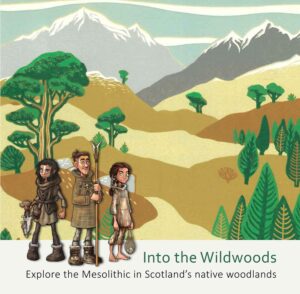
Reading the accounts of some excavations in Australia recently has made me rather melancholy. We have amassed a tremendous volume of data and investigation regarding the Mesolithic communities of Scotland. But something will always be missing. The voice of the people themselves. I do understand that is a given, we are, after all, dealing with prehistory. But it is a bit sad isn’t it?
Conventional archaeology relies on the assessment of the significance of every site. Those ascribed a high significance may be preserved, given the finance for detailed excavation, perhaps laid out for interpretation, certainly publicised to both academia and the public. Those ascribed little significance may well disappear without trace. Excavation, if it takes place at all, is likely to be sketchy, publication confined to an archive, or minor paper.
But our assumptions of significance reflect merely the significance of the site to archaeology today. It has no relation to how people saw the place in the past. You do not have to leave serious material clutter in order to consider somewhere to be special. Our own twenty-first century society increasingly emphasises the value of open spaces with minimal human intervention. Thus, crucial archaeological decisions are based on contemporary criteria that relate to our society, not the societies of the past. We are not even looking at representative samples of material culture. The archaeological record for both Palaeolithic and Mesolithic is, for reasons of preservation, usually restricted to stone tools, and we have no idea of the role that those tools performed in relation to the other paraphernalia of everyday life. The ball point pen is essential to my way of life, but it would be hard to assess the significance of modern settlements from the remains of ball point pens alone.
Archaeologists are, I hope, aware of this. But for me it has a wider, more emotional resonance. There is plenty of relevant literature, among which Caroline Bird and her colleagues bring out very clearly the way in which conventional archaeology misses the voice of the very people who engaged with the sites under consideration. They have produced a lovely little book, Kakutungutanta to Warrie Outcamp, which looks at the meaning of a small area of Western Australia and the sites within it to those who have passed through over the last few millennia. There are many strands of evidence including archaeology and its related specialisations, traditional skills including making stone tools, and the narratives and emotional connections of the Nyiyaparli people whose land it is. It is clear that the significance of a site has little to do with the material culture that survives there and everything to do with less tangible factors.
In this the archaeologists who work alongside the Nyiyaparli people are lucky. It is possible to work together, to talk about their evidence and interpretations, and to take this information into account. It has made me horribly aware that when I consider an assemblage of stone tools, the post-holes and pits from which they were excavated, and the view and context of the site itself, I am missing the most important evidence of all, that of those to whom this place was home. They had a voice, but it is gone. We are separated by the gulf of time. How can I ever assess the significance of their places? I feel arrogant even attempting to think about it.
I don’t believe in universal rules of human experience. The more you read, the more you interact with other people, whether from your own community or further afield, the more you realise that no two experiences, no two points of view are ever quite the same. How dare we think we can summarize the outlook of a Mesolithic hunter with a hungry family at home, or a Neolithic sheep farmer whose child has just died?
Archaeology is about researching past communities: it is about people. The people of the past. Yet we are prevented from ever actually reaching them. I feel as if my work will always be incomplete. My understanding of the past certainly is.
You must be logged in to post a comment.